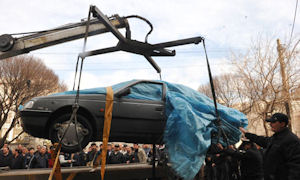 Mostafa Ahmadi Roshan, a leading Iranian nuclear scientist working at one of Iran’s nuclear enrichment facilities, was killed in a car bomb explosion on Wednesday in the latest of a series of assassinations and attempted killings the Iranian regime blames on Israel and the United States. "The bomb was a magnetic one and the same as the ones previously used for the assassination of the scientists, and the work of the Zionists [Israelis]," the deputy governor of the capital Tehran claimed.
Mostafa Ahmadi Roshan, a leading Iranian nuclear scientist working at one of Iran’s nuclear enrichment facilities, was killed in a car bomb explosion on Wednesday in the latest of a series of assassinations and attempted killings the Iranian regime blames on Israel and the United States. "The bomb was a magnetic one and the same as the ones previously used for the assassination of the scientists, and the work of the Zionists [Israelis]," the deputy governor of the capital Tehran claimed.
The 32-year-old professor was a chemistry expert and director of the Natanz uranium enrichment plant in central Iran, was killed after two assailants on a motorcycle attached magnetic bombs to his car, according to the semi-official Fars news agency. Two other Iranians were reported injured in the blast. The incident resembles earlier attacks on scientists connected to Iran's nuclear program. Tehran University physics professor Masoud Ali Mohammadi was killed in January 2010 when a remote-controlled bomb attached to a motorcycle exploded near his car as he was preparing to leave for work.
In November 2010, a pair of back-to-back bomb attacks in different parts of the capital killed one nuclear scientist and wounded another. Majid Shahriari, the scientist who died, was a member of the nuclear engineering faculty at Shahid Beheshti University in Tehran and cooperated with the Atomic Energy Organization of Iran. The wounded scientist, Fereidoun Abbasi, was almost immediately appointed head of Iran's atomic agency. In July 2011, gunmen on motorcycles killed Darioush Rezaeinejad, whom initial Iranian reports described as a scientist involved in the country's nuclear program. Officials later denied Rezaeinejad had any links to the program, but blamed his killing on the US and Israel. Both countries have repeatedly the accusations.
The West suspects Iran of developing nuclear weapons.
Meanwhile, new sanctions against Iran have started to bite. The Iranian currency rial lost 20 percent of its value against the US dollar in the past week and Iran has threatened to shut the Strait of Hormuz, through which 40 percent of trade oil passes. US Treasury Secretary Timothy Geithner, visiting Beijing, appealed for Chinese cooperation on nuclear non-proliferation, while Secretary of State Hillary Clinton said Iran's move to enrich uranium near the city of Qom was "especially troubling".
"This step once again demonstrates the Iranian regime's blatant disregard for its responsibilities and that the country's growing isolation is self-inflicted," Clinton said in a statement that followed Iran's announcement it had started enrichment in the Fordo mountain bunker complex.






